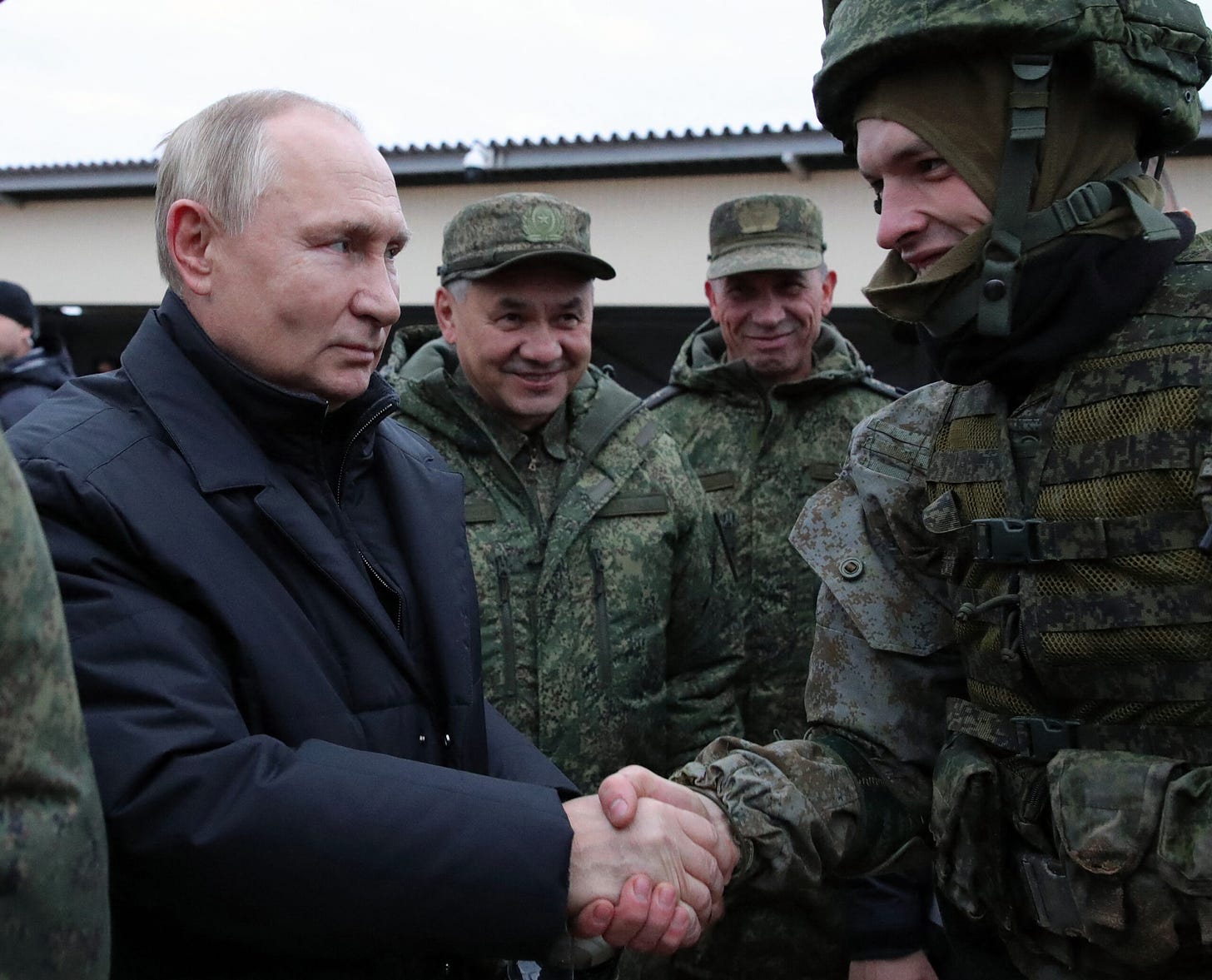Vladimir Putin, Kevin McCarthy, and the Ukraine War
The outlook from the Kremlin and the GOP caucus room.

[On the October 21, 2022 episode of The Bulwark’s “Beg to Differ” podcast, guest Kori Schake joined host Mona Charen and panelist Damon Linker in discussing the Russian dictator’s grip on power and the House GOP leader’s pledge to cut Ukraine funding.]
Mona Charen: I would like to discuss Putin and Ukraine and martial law. He has declared martial law in the provinces that he illegally annexed just a few weeks ago. Kori, since the last time you joined us on Beg to Differ, you have actually visited Ukraine and met with Volodymyr Zelensky. . . . I’d like you to explain to us, if you could, what this means about Putin declaring martial law in these provinces? Why is he doing that? What’s the purpose? What does it signify?
Kori Schake: I actually think it’s a pretty worrisome sign, because he’s not in control of most of the territory of the four regions of Ukraine that Russia purportedly annexed. And if people are being governed, you don’t have to declare martial law.
So Putin’s theory of the war, that Ukraine isn’t a separate nation, and that it’s part of Russia, and therefore Russia needs to control it. The fact that they had to declare martial law is by definition a failure of Putin’s theory of the war. And it also speaks to the likelihood of an insurgency being fomented against Russian control from Ukrainians living in that area.
The reason I say it’s worrisome is because it’s one more demonstration—as the declarations of annexation of the four regions were—that Putin’s actions are increasingly divorced from reality. You know, Russia’s losing this war. And I think, at least by March of next year, but probably by the end of this calendar year, Russia will have lost this war, and that Putin is refusing to acknowledge the losses, and is instead making political declarations—writing checks that his military can’t cash—suggests that he may be either losing his grip on what’s happening, or willfully misrepresenting it.
Charen: Damon Linker, I’m going to bring you in here. One of, I guess, Putin’s only hopes to turn the tide is if the leadership in the United States changes. And this week, we had word from Kevin McCarthy if the Republicans take control in November, he would be the new speaker of the House. And he has said that if they do indeed assume the majority, that the Republicans are no longer going to, as he put it, write a “blank check” to Ukraine—which is, of course, not what we’ve been doing. But in any event, we also have Scott Perry, of the hilariously named Freedom Caucus, who has announced that, again, if Republicans take control, that he’s going to conduct investigations into the Biden-Zelensky relationship.
Damon Linker: Well, certainly the investigations are going to proliferate, that’s for sure. No doubt about that. It’s going to become a total circus in Washington for the next two years if Republicans take control. It’ll be Biden investigations morning, noon, and night. As for supporting aid to Ukraine, I frankly think McCarthy’s bluffing. Maybe I’m being overly optimistic here, but it sort of strikes me as the equivalent of someone in charge of the Democratic caucus leaning into a midterm election back when the Democrats were very divided, say about the first Gulf War or the Iraq War, and promising to do what the kind of anti-war faction on the left wants in order to make sure that people show up to vote in three weeks. . . .
So this is a way of throwing a sop to the Trumpist faction of the party to make sure that they show up to vote for the midterms on November 8. When push comes to shove, I believe, and I very much hope, that they’ll have to make a stink about it, they’ll maybe cut an appropriation by a few tens of billions of dollars to demonstrate that they’re not giving Biden everything he asks for. But again, the party is divided. And there are still a lot of people in the Republican party, especially the officeholders . . . who still believe in the strong American defense and are in favor of our general policy toward Ukraine, even if they don’t want to give Biden personal credit for it.
To listen to this episode of the "Beg to Differ" podcast or to subscribe to the show on your podcast app of choice, click here.









